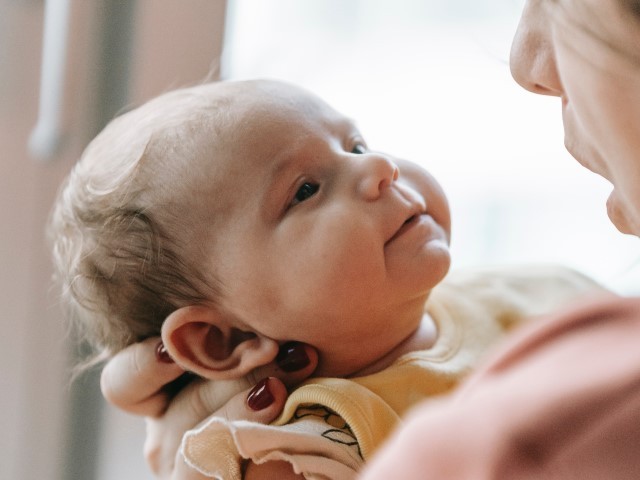Yes, Baby Girls Who Are ‘Unwanted’ Because of Their Sex Are Aborted in America

If an unborn baby in the United States is a girl, her chances of being born are much lower than if she were a boy. That’s because in America, only seven states ban sex-selective abortions.
That’s why pro-life members of Congress have proposed the Prenatal Non-Discrimination Act, or PRENDA, which bans such abortions“undertaken for purposes of eliminating an unborn child of an undesired sex.”
Members of Congress have introduced various iterations of this bill since 2012, but so far, none have passed both the House and the Senate.
Rep. Ann Wagner, R-Mo., introduced the most recent version, H.R. 6465, in January 2022.
Advocates for the bill point out that the U.S. already bans discrimination based on sex and that all PRENDA would do is extend this same right to females in the womb.
Scholars lack exact statistics on why women choose an abortion because there is limited data on the numbers of abortions and the reasons for them.
What we do know is twofold. First, national pro-life organization Live Action went undercover to Planned Parenthoods in 2012 to test the question of sex-selective abortions. It found that Planned Parenthood was willing to give women abortions when their explicit reason was because of the sex of the baby.
Second, sex ratios at birth, or SRB, from different ethnicities suggest the presence of sex-selection. The global average shows 103 male babies born per 100 female babies. But in Asian-Pacific regions like India or China, the SRB is as high as 122.8 males per 100 females. This ratio is horrific. To stop this trend, China and other Asian nations went so far as to ban doctors from telling women the sex of their unborn children.
When it comes to the U.S., SRB data for some foreign-born populations reflects a similar preference for male children (few states restrict people from aborting their children based on sex). Yet these numbers go back to normal when scholars look at the SRB data for U.S.-born parents.
It should be a no-brainer to protect unborn girls from being aborted because of their sex. With Roe v. Wade and Planned Parenthood v. Casey overturned this past summer at the Supreme Court, no federal restrictions exist to bar a law like PRENDA.
As sociologist Barbara Katz Rothman says, the question “is not whether or not to have a child, but rather, what kind of child to have. The abortion right should not include the right ‘to bear or abort a particular child’ based on … gender.”
There is difference, however small, between “I don’t want any child” and “I don’t want this child” because she is a girl.
Feminists and social conservatives alike should want to see this base practice banned.
The Guttmacher Institute, the research arm of Planned Parenthood, sees it differently, though. First, it argues that sex-selective abortions are rare—so rare that it’s not worth passing laws to ban it.
Second, it says that sex-selective abortions place undue burdens on doctors and patients. Why? Guttmacher claims that it would require doctors to question why each woman wants an abortion. It claims this could further stigmatize women from Asian-Pacific countries who are more likely to seek a sex-selective abortion.
Besides, spending more time discussing her motivation behind the abortion could cause her to rethink it.
There is good reason to question how “rare” such abortions are. Guttmacher relies on data from 1980 to show that state-level attempts to ban sex-based abortions do not change SRBs. This ignores recent studies that show sex-selective abortion ratios have increased since the late 1990s. Studies show that as prenatal technology develops, so does a nation’s disparity in SRB.
“Rare” or not, aborting even one girl or boy based on her or his sex is one too many.
Still, Guttmacher gets one thing right. Laws banning such abortion“do not prohibit other sex selection methods, such as sperm sorting or preimplantation genetic diagnostics,” also known as PGD.
With sperm sorting, the doctor “tests” the sperm to see if it has an X or Y chromosome. Since sperm decide the sex of an embryo, a family may choose to only use sperm with a Y chromosome. That way, they have a 70% chance of creating a male embryo (it’s not 100% because the sorting process can be difficult and isn’t always entirely successful in separating the sperm based on sex).
With PGD, a doctor creates multiple embryos for the purpose of testing them for genetic abnormalities. This test also reveals the sex of the baby.
Sperm sorting occurs before the creation of an embryo whereas PGD requires that doctors make multiple embryos before determining sex.
Sperm sorting is a problem because it controls the kind of child created. Families do not receive the child with open arms but instead design it. It’s not as heinous as sex-selective abortion, but it rests on the same premise—namely, that it’s acceptable to create or destroy the life of a child based on the parents’ desire.
In PGD, doctors destroy “unfit” or unwanted embryos, including based on the parents’ preference for a boy or girl. This is, in many ways, equivalent to sex-selective abortion. Given the fact that life begins at conception, this destroys unborn children.
Because of these issues, many nations like Canada and the United Kingdom won’t reveal an embryo’s sex in IVF.
This past summer, a gay couple in the United States sued a fertility clinic on the grounds they “ordered” two boys but received a girl instead. This is the epitome of conditional love. When adults order children to fulfill their own desires, they demean the inherent value and dignity of those children.
Congress needs a new PRENDA that bans sex-selective abortion and considers robust limits on PGD. No child should lose her life because she is the “wrong” or unwanted sex.
Whether the child is growing in the womb or an embryo in a lab, she has the right to life.
Kamala Harris Omits ‘Creator’ and Right to ‘Life’ from ‘Life, Liberty and the Pursuit of Happiness’ Quote

In a pro-abortion speech decrying last year’s overturning of Roe v. Wade, Vice President Kamala Harris omitted the right to life being endowed by the Creator when she quoted the Declaration of Independence.
Speaking at a nightclub and concert venue called The Moon on Sunday, Harris invoked the Declaration while attempting to frame abortion as a right:
“So we are here together because we collectively believe and know America is a promise. America is a promise. It is a promise of freedom and liberty — not for some, but for all.
“A promise we made in the Declaration of Independence: that we are each endowed with the right to liberty and the pursuit of happiness.”
However, according to the Declaration of Independence, “life” is also an inalienable right – and Americans possess all three rights because they are “endowed by their Creator”:
“We hold these truths to be self-evident, that all men are created equal, that they are endowed by their Creator with certain unalienable Rights, that among these are Life, Liberty and the pursuit of Happiness.”
Harris then appears to suggest that the rights have not been endowed by a Creator:
“Be clear. These rights were not bestowed upon us. They belong to us as Americans. And it is that freedom and liberty that enabled generations of Americans to chart their own course and decide their own future with, yes, ambition and aspiration.”
Watch: Pro-Life Activist Details Heartwarming Story of Healing After Abortion
A pro-life speaker and activist detailed her story of finding healing through a group at church after 17 years of suffering following her abortion.
Cindy Brunk told her story at the 50th annual March for Life rally against abortion on Friday, recalling how she was told she was pregnant just before she turned 19.
“Now, I remember thinking that I needed to decide if I wanted to become a mother. You see, I didn’t realize that I already was one,” Brunk said, while speaking behind a Silent No More Awareness Campaign sign that read “Women Do Regret Abortion.”
“I chose abortion because well-meaning loved ones encouraged it or offered no alternatives. I was ashamed of being pregnant. I was afraid I wouldn’t be able to finish college, and I was still a child myself,” she continued.
Brunk said she blacked out when her abortion began, and only remembered the boy who took her to the clinic standing at a counter, as well as walking down a long hallway before entering into the abortion room and seeing a man she had “never seen before walking in.”
“My memory returned three days later, after a nine-hour bus trip home, and working two shifts at a restaurant,” she said. “My memory returned three days later, as I opened a letter from the clinic stating that all of the tissue had successfully been removed. I know now that that tissue included the fully-formed hands and feet and the once beating heart of my very first child — and how I wish I had fought for him.”
Brunk said following her abortion, she suffered for 17 years from “nightmares, flashbacks, anxiety attacks, inability to bond with [her] future children, or trust [her] parenting decisions.”
“Because after all, look how I’d done with my first. My marriage was falling apart, and I was quick on my way to becoming a single parent,” she said.
But after 17 years of grappling with her abortion, Brunk said she found healing when someone at church shared that they had been through an after-abortion program.
“I started that program feeling like the woman at the well — and I finished it absolutely certain that I am a beloved daughter of an almighty King,” she said.
According to her website, Brunk is now a national speaker, author, and pro-life activist who has traveled around the United States sharing her story and raising money for local pregnancy care centers. She also says she has served the Hope Medical Clinic for more than two decades — the same organization that provided her healing program.
Brunk was one of several speakers at the March for Life last week. March for Life describes itself as “the largest annual human rights demonstration in the world,” and has been convening since the Supreme Court handed down its Roe v. Wade decision in 1973 declaring a supposed “right” to abortion. The organization says even with Roe overturned, “the necessary work to build a culture of life in the United States of America is not finished.”
“Rather, it is focused differently. Sadly, the number of abortions annually is still well over 900,000 each year, and that number is expected to decrease only by roughly 200,000 each year in a post-Roe America,” the group states. “Many national legislative battles loom, including even keeping longstanding Hyde protections, which limit government funding for abortion on annual appropriation bills.”
March for Life continued:
The Hyde Amendment has saved over 2 million lives and is arguably the most impactful pro-life policy in our nation’s history, but now cannot be taken for granted. Last, our most important work is changing hearts and minds. The goal of the national March for Life is to not only change laws at the state and federal level, but to change the culture to ultimately make abortion unthinkable.
“With the role of the states being more important, we are also growing a strong state March for Life initiative quickly; however, we will continue to march every January at the national level until a culture of life is restored in the United States of America,” the website reads.

People attend the 50th annual March for Life rally on the National Mall on January 20, 2023, in Washington, DC. Pro-life activists attended the annual march to mark the first to occur in a “post-Roe nation” since the Supreme Court’s Dobbs vs Jackson Women’s Health ruling. (Chip Somodevilla/Getty Images)


No comments:
Post a Comment